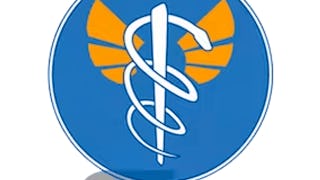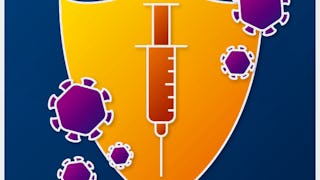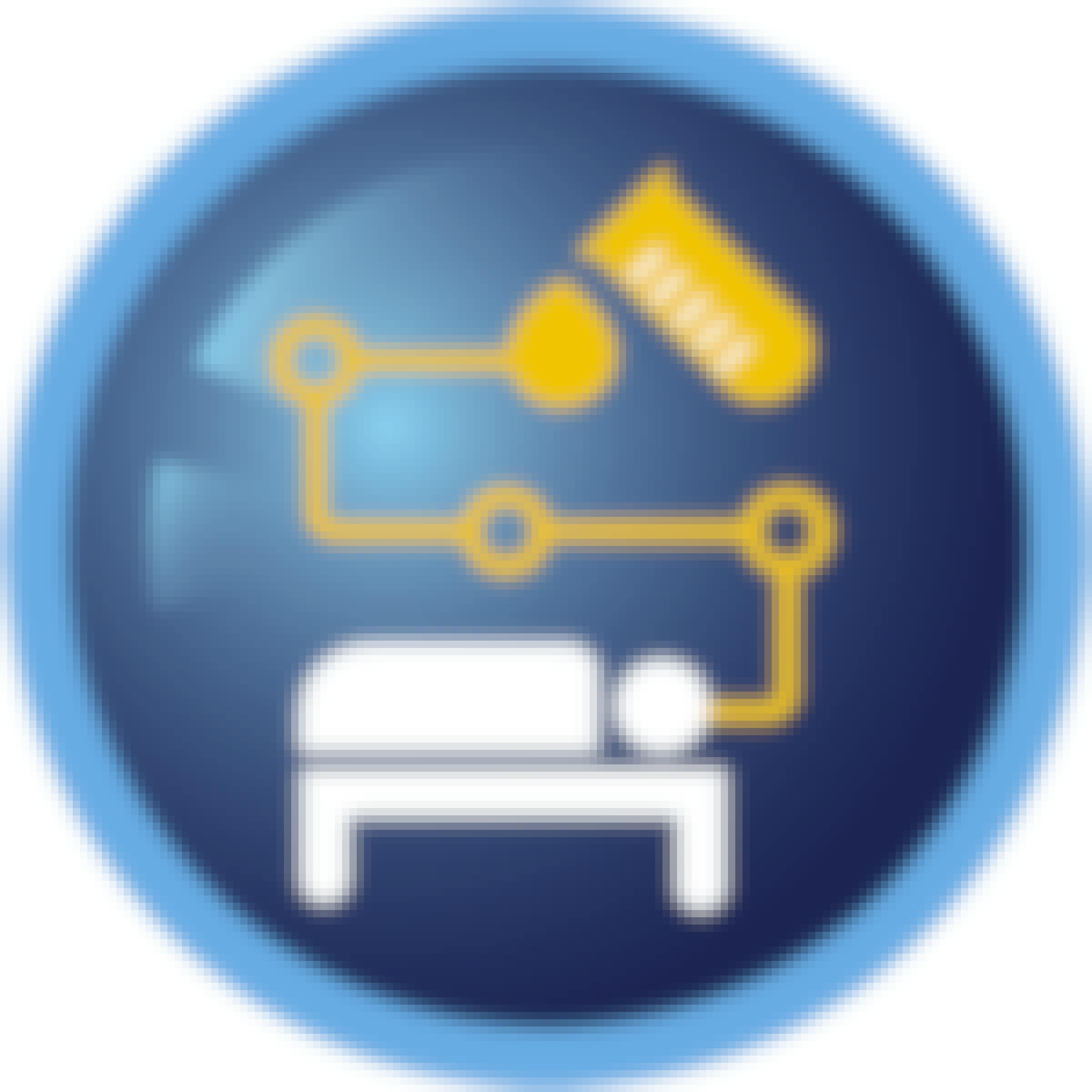- Browse
- Pharmacology
Pharmacology Courses
Pharmacology courses can help you learn drug classifications, pharmacokinetics, pharmacodynamics, and therapeutic applications. You can build skills in dosage calculations, understanding drug interactions, and evaluating clinical trial data. Many courses introduce tools such as pharmacological databases and software for drug analysis, that support conducting research and making informed decisions in clinical settings. By exploring these topics, you can gain a comprehensive understanding of how medications work and their impact on patient care.
Popular Pharmacology Courses and Certifications
 Status: Free TrialFree TrialI
Status: Free TrialFree TrialIIcahn School of Medicine at Mount Sinai
Skills you'll gain: Matlab, Bioinformatics, Quantitative Research, Unsupervised Learning, Data Synthesis, Research, Mathematical Modeling, Molecular Biology, Pharmacology, Science and Research, Cell Biology, Biotechnology, Biomedical Technology, Scientific Methods, Physiology, Differential Equations, Computational Logic, Biochemistry, Network Analysis, Biology
4.4·Rating, 4.4 out of 5 stars988 reviewsIntermediate · Specialization · 3 - 6 Months
 Status: Free TrialFree TrialU
Status: Free TrialFree TrialUUniversity of Colorado System
Skills you'll gain: Vital Signs, Patient Evaluation, Airway Management, Trauma Care, Emergency and Intensive Care, Medical History Documentation, Patient Communication, Child Health, Childbirth, Automated External Defibrillator, Medical Terminology, Health Assessment, Maternal Health, Patient Advocacy, Basic Patient Care, Respiratory Care, Neurology, Medication Administration, Cardiology, Pharmacology
4.8·Rating, 4.8 out of 5 stars2.6K reviewsBeginner · Specialization · 3 - 6 Months
 Status: Free TrialFree TrialN
Status: Free TrialFree TrialNNovartis
Skills you'll gain: Pre-Clinical Development, Clinical Trials, Pharmacology, Drug Development, Clinical Research, Pharmaceuticals, Competitive Intelligence, Safety Assurance, Biotechnology, Biochemistry
4.8·Rating, 4.8 out of 5 stars153 reviewsIntermediate · Course · 1 - 4 Weeks
 Status: Free TrialFree TrialU
Status: Free TrialFree TrialUUniversity of Colorado Boulder
Skills you'll gain: Pain Management, Psychiatry, Clinical Psychology, Mental and Behavioral Health Specialties, Mental Health Diseases and Disorders, Pharmacology, Public Health, Health Policy, Gerontology, Mental Health, Pharmaceuticals, Medical Science and Research, Substance Abuse, Research, Hospice, Medication Administration, Health Care, Clinical Research, Mental and Behavioral Health, Exercise Science
4.7·Rating, 4.7 out of 5 stars517 reviewsBeginner · Specialization · 3 - 6 Months
 Status: Free TrialFree TrialU
Status: Free TrialFree TrialUUniversity of Minnesota
Skills you'll gain: Drug Interaction, Contraindication, Patient Education And Counseling, Mindfulness, Patient Referral, Pharmacology, Treatment Planning, Health Care Procedure and Regulation, Pain Management, Patient Safety, Clinical Assessment, Health Care, Clinical Practices, Nursing Practices, Pharmacotherapy, Health Promotion, Health And Wellness Coaching, Mental and Behavioral Health, Patient-centered Care, Music
4.8·Rating, 4.8 out of 5 stars1.8K reviewsBeginner · Specialization · 3 - 6 Months
 Status: Free TrialFree TrialI
Status: Free TrialFree TrialIImperial College London
Skills you'll gain: Immunology, Infectious Diseases, Molecular Biology, Epidemiology, Microbiology, Public Health, Drug Development, Biotechnology, Medical Science and Research, Climate Change Programs, Cell Biology, Health Disparities, Biology, Clinical Trials, Laboratory Research, Pharmacology, Public Health and Disease Prevention, New Product Development, Emerging Technologies, Manufacturing Processes
4.9·Rating, 4.9 out of 5 stars87 reviewsIntermediate · Specialization · 3 - 6 Months
 Status: PreviewPreviewU
Status: PreviewPreviewUUniversity of Glasgow
Skills you'll gain: Clinical Trials, Drug Development, Healthcare Ethics, Pharmaceutical Terminology, Good Clinical Practices (GCP), Pharmacology, Regulatory Affairs, Healthcare Industry Knowledge, Emerging Technologies, Good Manufacturing Practices, Pre-Clinical Development, Regulatory Compliance, Precision Medicine, Biotechnology, Pharmacotherapy, Informed Consent
4.6·Rating, 4.6 out of 5 stars57 reviewsBeginner · Course · 1 - 4 Weeks
 Status: NewNewStatus: Free TrialFree TrialL
Status: NewNewStatus: Free TrialFree TrialLLecturio
Skills you'll gain: Molecular Biology, Biochemistry, Cell Biology, Pharmacology, Biology
Intermediate · Course · 1 - 4 Weeks
 Status: Free TrialFree TrialN
Status: Free TrialFree TrialNNovartis
Skills you'll gain: Pre-Clinical Development, Drug Development, Pharmaceuticals, Pharmacology, Clinical Research, Clinical Trials, Pharmacotherapy, Chemistry, Manufacturing and Production
4.8·Rating, 4.8 out of 5 stars52 reviewsIntermediate · Course · 1 - 4 Weeks
 Status: Free TrialFree TrialJ
Status: Free TrialFree TrialJJohns Hopkins University
Skills you'll gain: Drug Development, Clinical Trials, Pharmaceuticals, Clinical Research, Pre-Clinical Development, Pharmacology, Medical Devices, Statistical Analysis, Epidemiology, Health Policy, Regulatory Compliance, Data Collection
4.8·Rating, 4.8 out of 5 stars32 reviewsMixed · Course · 1 - 4 Weeks
 Status: FreeFreeM
Status: FreeFreeMModerna
Skills you'll gain: Molecular Biology, Biomedical Technology, Pharmacology, Biotechnology, Biochemistry, Biology, Immunology, Precision Medicine, Pharmaceuticals, Cell Biology, Emerging Technologies, Medical Science and Research, Oncology
4.8·Rating, 4.8 out of 5 stars89 reviewsBeginner · Course · 1 - 4 Weeks
 Status: Free TrialFree TrialM
Status: Free TrialFree TrialMMedCerts
Skills you'll gain: Pharmacy Experience, Pharmacology, Pharmacist Assistance, Pharmacy Information System, Medical Prescription, Pharmacy Operations, Pharmacy, Medication Dispensation, Drug Development, Medication Administration, Pharmaceutical Terminology, Medical Terminology
4.5·Rating, 4.5 out of 5 stars79 reviewsBeginner · Course · 1 - 4 Weeks
In summary, here are 10 of our most popular pharmacology courses
- Systems Biology and Biotechnology: Icahn School of Medicine at Mount Sinai
- Become an EMT: University of Colorado System
- Introduction to Drug Hunting: Novartis
- Medical Cannabis: The Health Effects of THC and CBD: University of Colorado Boulder
- Integrative Health and Medicine: University of Minnesota
- Foundations in Virology and Vaccinology: Imperial College London
- Introduction to the Pharmaceutical Industry: University of Glasgow
- Molecular and Cell Biology: Lecturio
- Pre-formulation: Novartis
- Pillar #1: Drug Development - From Bench to Bedside: Johns Hopkins University










